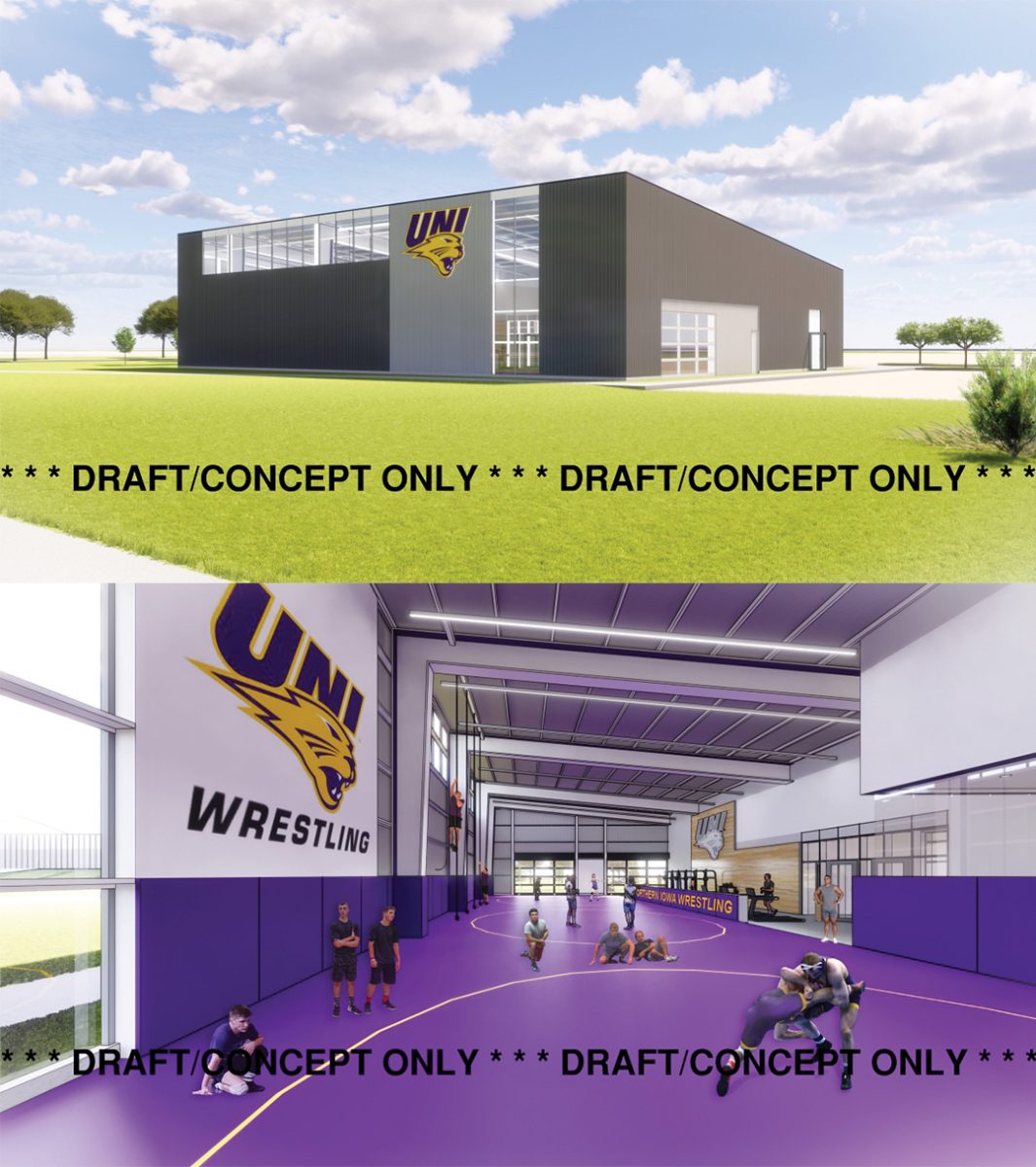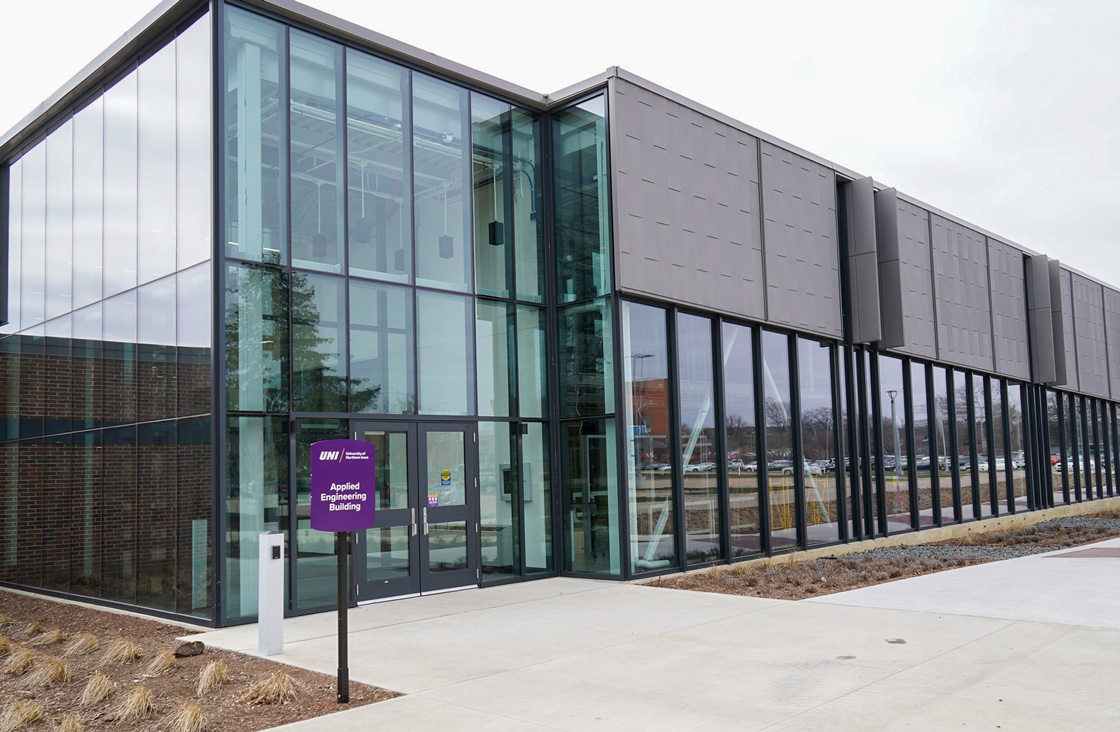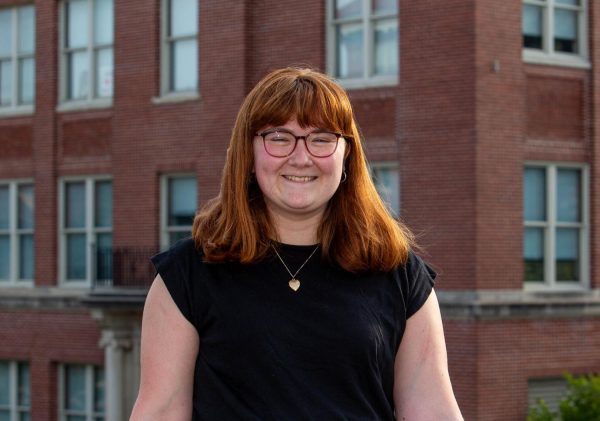Conceptual renderings have been released for what UNI Wrestling Head Coach Doug Schwab hopes will be their “next 100-year building.”
The renderings were revealed at a press conference before wrestling media day last Thursday. Permission to plan the new facility is currently pending Board of Regents approval, to be discussed at the Nov. 15-16 meeting held on UNI’s campus.
Also relying on the Board of Regents — the demolition of the West Gym.
Originally constructed in 1925, the West Gym holds history for a variety of programs at UNI including volleyball, basketball, cheer, dance, marching band and, most iconically, wrestling. The building was deemed uncertified for occupancy in July due to structural deficiencies, including an unstable east wall which has been reinforced with metal structural supports for the past four months.
According to the request, razing the structure would eliminate $10.8 million in building renewal costs. Estimates for repairing the building to full functionality are above $20 million, which does not include the cost of addressing the east wall.
The cost of demolition and site restoration is estimated at $1.3 to $1.5 million. The request states that the utilities and foundation would be removed, and the basement would be filled with soil and seeded with grass.
While the university may be closing a chapter on one of its oldest buildings, President Mark Nook spoke at the press conference about preserving the history and memories of the structure.
“We recognize the history of that building and the importance not just to Panther wrestling … There’s a lot of people that are committed and connected to that facility. Unfortunately the bones aren’t there anymore,” he said.
“There’s a lot of things I think we can do. At this point it’s a matter of making sure we have people that can go in and evaluate what’s there, what’s salvageable, and also asking some questions about what’s really important to our wrestlers and what are the physical pieces that will really be meaningful,” Nook added.
“There will clearly be pieces of the structure that are — the word everybody wants to use is salvaged, and that’s just so wrong in this case,” he said. “There’ll be pieces that will be honored, that will be in a place to honor the facility, but more importantly, honor the student athletes that have trained in that facility.”
After being forced to relocate their training facility from the West Gym to USA Mat Club on East 19th Street in July, Coach Schwab said that the team’s focus has been on the game.
“My focus from day one will always be our athletes and their progress,” he said.
“It is the people they’re going to be around that are the most important. It’s not the building. The building does not get things done,” Schwab added.
As described in the Board of Regents project summary, the proposed facility would be 11,000 gross square feet with practice areas, wrestling mats, a team room, a strength and conditioning area, training room, lockers, showers, restrooms, coaches’ offices, an athlete lounge and general storage.
The new facility would be funded entirely by private gifts. The project summary lists the estimated cost of the building at $5 million, however, that amount is the minimum threshold for regents approval. The total cost will depend on the amount fundraised, an effort Athletics Director David Harris said will involve the whole community.
“It’s something that’s going to take all of us to be able to make happen, so we need everyone who loves our student athletes, our coaches and this program to really come together to give us a chance to be able to build this facility and give Panther wrestling a new home,” Harris said.
The exact location of the new facility is also not fully set in stone. The project summary lists the most cost-effective location as the gravel parking lot south of 27th Street and west of Panther Parkway. In selecting a location, UNI officials have stated that their priorities are finding a place close to their competition space in the McLeod Center that is also cost-effective to build on.
UNI does not currently have a timeline set for the project, however, Harris said that it is a priority for the university.
“Just based on the urgency around this situation and how things have happened, some of which have been unexpected, we feel like this is top priority for us. This is something we look forward to making happen, getting done and having our student athletes and coaches really enjoy the benefit of all our work,” he said.









